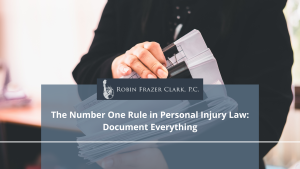 Accidents can turn your life upside down in an instant. The pain, the disruption, and the uncertainty that follows are hard enough to handle without having to worry about legal battles. However, ensuring you get the justice and compensation you deserve starts with documenting your injuries properly. It’s not just about the money–more often than not, most survivors wish the ordeal never happened—it’s about holding those responsible accountable and making sure you get the support you need.
Accidents can turn your life upside down in an instant. The pain, the disruption, and the uncertainty that follows are hard enough to handle without having to worry about legal battles. However, ensuring you get the justice and compensation you deserve starts with documenting your injuries properly. It’s not just about the money–more often than not, most survivors wish the ordeal never happened—it’s about holding those responsible accountable and making sure you get the support you need.
Seek Immediate Medical Attention
First things first, see a doctor immediately after the accident. This is not just for your health; it’s for your legal protection. Even if you think your injuries are minor, medical professionals can identify issues that might not be immediately obvious. And every visit creates an official record of your injuries. Do not skip follow-up appointments. Each visit builds a continuous care history, critical for proving the extent and progression of your injuries.
Document Medical Visits and Treatments
Every time you visit the doctor, undergo a test, or get a prescription, document it. Get copies of all your medical records related to the accident. These include doctor’s notes, diagnostic tests, prescriptions, and treatment plans. These records should detail your injuries, the treatment you’ve received, and any long-term impacts you might face. Keep all receipts and bills for everything from doctor visits and therapy sessions to prescriptions and medical devices. These documents are the backbone of your claim.
Take Photographs of Your Injuries
Pictures speak louder than words. Take photos of your injuries as soon as possible after the accident. Don’t stop there—continue to document your injuries over time. Capture each injury from multiple angles and include a common object for scale. This ongoing visual record can vividly show the severity and impact of your injuries, countering any claims that you’re exaggerating.
Maintain a Pain and Symptom Diary
Start a diary from the day of the accident. Make daily entries about your pain levels, symptoms, and how your injuries affect your daily life. Note any activities you can’t perform and any help you need with routine tasks. This diary is your personal account of how the injuries have disrupted your life and can be a powerful piece of evidence in your claim.
Record Witness Statements and Contact Information
If there were witnesses to your accident, get their contact information immediately. Their testimonies can be crucial. Ask them to write down what they saw as soon as possible while the details are still fresh in their minds. These statements can corroborate your account and add weight to your claim.
Document Communication and Expenses
Keep a detailed record of all correspondence related to your accident and injuries. This includes communications with healthcare providers, insurance companies, and any other relevant parties. Also, document any additional expenses incurred due to your injury. This can include travel costs to medical appointments, home care services, and modifications made to your home or vehicle to accommodate your injury. Every detail matters when building a strong case.
Consult with a Legal Professional
Consulting with a personal injury lawyer is a critical step. Documenting your injuries thoroughly is a tedious, bureaucratic task, but it’s a fundamental part of securing your right to justice and fair compensation. By meticulously collecting and working with an attorney, you can present clear and compelling evidence of your suffering and its impact on your life. This thorough approach can significantly boost your chances of securing a fair settlement or court award.
If you’ve been injured in an accident and need legal advice, don’t wait. Contact Robin Frazer Clark, P.C. at (404) 873-3700 to schedule a consultation. Stand up for your rights and ensure you get the justice and compensation you deserve.
 Atlanta Injury Lawyer Blog
Atlanta Injury Lawyer Blog












